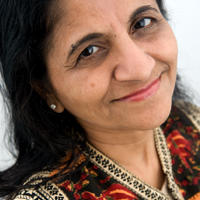
nshuklab@wellesley.edu
(781) 283-2670
Religion
B.A., M.A., Maharaja Sayajirao University of Baroda (India); M.Div., Ph.D., Harvard University
Green Hall 340A
Neelima Shukla-Bhatt
Professor of ReligionInterests include arts in religious/cultural history of South Asia; the divine and the human feminine in Hindu traditions; Gandhian thought and practices; the self and the other in South Asian philosophical traditions and history.
What stirs my research and teaching interests is how understandings of the cosmos and human place within it in various part of the world get expressed through cultural forms such as poetry, narratives, music, dance, visual arts, and digital media that have far reaching implications in history and contemporary affairs. As an undergraduate student in India I studied English, while being surrounded by popular cultural forms which expressed worldviews in music, dance, and poetry. In the US, I pursued graduate study in history of religion at Harvard University with a focus on cultural expressions of devotion in South Asia in an interdisciplinary manner, combining literary analysis with ethnographic work and performance studies. My research and teaching since have been interdisciplinary.
My first book, co-authored with historian Surendra Bhana, A Fire That Blazed in the Ocean: Gandhi and Poems of Satyagraha in South Africa 1909-1911 studies poems published by Gandhi in his weekly Indian Opinion during the first non-violent resistance movement he led in South Africa. The book examines poems written by participants in the movement to be recited or performed in public, as historically significant texts embedded in cultural currents of India, yet expressing resistance to the most powerful empire of the world at the time. It highlights the contribution of the little-known participants in shaping the concept of Satyagraha (truth force), the foundational principle of Gandhi’s later internationally celebrated movements.
My monograph Narainha Mehta of Gujarat: A Legacy of Bhakti in Songs and Stories studies the life, work, and memory of a fifteenth century devotional poet from Gujarat in Western India. It examines how the popular devotional songs attributed to the poet and cultural memory of his life in hagiographic narratives have offered a powerful resource for moral inspiration to the people of the region for centuries. It discusses how Gandhi tapped into this resource to influence the moral subjectivity of his followers in movements for independence and social reconstruction in the early twentieth century. Parallels are also drawn to the use of popular hymns in the civil rights movement in the US.
Some of my recent work is focused on the divine feminine and religious lives of women in Hindu communities in India and in the diaspora. In one essay, I examine the rise of village goddesses in the pan-Indian Hindu pantheon as their devotees rise in the political and social arena. In others, I examine gendered popular expressions of devotion that offer agency to women in patriarchal settings and have been effectively used by feminist movements in India. I am currently working on two monographs focusing on different aspects of the Hindu tradition.
At Wellesley, I aim to lead students in my courses in South Asian religions, art, literature and cinema, to view the region’s cultural products as parts of a continually evolving history of its people. Beyond Wellesley, in 2016 I was invited to teach an online course on Hinduism in HarvardX series “World Religions through its Scriptures,” a part of their Religious Literacy initiative to aiming to encourage interreligious communications among world’s citizens. The course has since run three times and has drawn thousands in conversations worldwide. I have also taught a course on “South Asian Models of Religious Pluralism” at Ashoka University Delhi, India, and lectured on the topic at educational institutions in India and in media. As a teacher and scholar, I hope to contribute to global awareness of diversity of religious traditions and thinking about how this diversity can be transformed into pluralism.
When not teaching or writing, I do my riyaz (practice) in Indian classical music.
